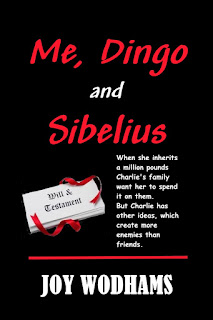Heroines Don't Have To Be Beautiful, Blonde and Boring
The journey of a plain girl through your novel can be far more interesting. In my latest novel, ME, DINGO AND SIBELIUS, my heroine Charlie has become more lovable and more alive with each chapter. I'm really very fond of her and felt sad when I finally put her to bed! Perhaps I'll write a sequel one day.
Here's the first chapter. I hope you like it.
It's Monday. And
it starts like any other Monday.
Mum downstairs
cremating breakfast. My sister Georgie and my niece Rosie screaming
at each other in Rosie's bedroom. My other niece, Daisy, screaming
for her morning bottle. The kitchen radio blasting out the Chris
Evans Show. And me, grumpy because my hair drier, the only one in the
house that still works, is missing.
Looking into the
mirror I see my Dad. As usual. With the hair drier I might at least
move up a notch or two on the charm scale.
'OK, who's got
it?' I yell.

Of course, I
already know. Rosie, who spends hours each morning creating elaborate
hairstyles to impress her schoolmates. Is it worth marching into her
bedroom and trying to claim it? I've tried that before and it's come
down to a physical fight for possession which Rosie usually wins.
It's surprising how strong a skinny twelve year old can be.
Right now her
quarrel with Georgie is escalating. I can hear them through the thin
wall.
'I don't care what
the others wear, Rosie, you're NOT going to school in six inch heels!
Apart from the fact that you'll probably break an ankle, you look
ridiculous.'
'Everybody's
wearing them, I'll be the odd one out.'
'I'm sure they're
not. And you can take off those false eyelashes, too. They're mine,
aren't they? For heaven's sake, you're twelve, Rosie.'
'And ten months.
Practically a teenager!' Rosie's sobbing increases in volume, but
it's not going to soften Georgie's heart.
Who'd be a Mum?
Me, I admit. But fat chance now. Thirty two already and only one
proposal to chalk up. Jason Fishlock, former handyman at the
Sundowners Retirement Home. Clammy hands and a noticeable squint. He
must have thought he was in with a chance, being that I wasn't likely
to attract anyone else.
Pausing only to
give my bird's nest curls one last despairing comb through, I grab my
rucksack and run downstairs.
In the kitchen
Mum, a vision of cool elegant efficiency, is stirring something
vigorously in a large pan. A stranger watching her might assume she
knew what she was doing, despite the scatter of eggshells on the
floor, leaving slimy trails of albumen across the tiles. Once upon a
time Georgie reigned in the kitchen, but that was in the days when
she still had dreams of owning her own restaurant. Nowadays, leaving
out Mum's occasional urge to cook breakfast, our family's diet
consists primarily of tins, packets, takeaways and pizzas, unless I
have a day off and I'm prepared to cook a meal from scratch. The
irony is that the others appear to thrive on it. I'm the only one who
ever gets zits or stomach ache or lank hair.
'I'm making
scrambled egg,' says Mum.
'I guessed.'
She turns the pan
upside down. 'Hmm. Seems to have set solid. Still, shame to waste it.
Want some?'
'Just toast for
me, Mum. I'm having lunch out.'
Her eyes turn
bright with hope. 'Anywhere nice? Who are you going with?'
'British Home
Stores, and Alice Howell. We're taking the residents on a shopping
trip.'
'Still. You never
know who you might see while you're out. You should wear that nice
green jacket I got you from the charity shop.'
Yeah. The one that
makes me look like a leprechaun's kid sister.
'Give up, Mum. I'm
not likely to meet Mr Right in BHS or anywhere else. I'm past my sell
by date and I look like – like - '
'You look very
nice, love.'
Nice. Not
beautiful. Not even pretty. Just – nice.
'If you'd do
something with your hair, and maybe a bit of make-up?'
'It's no use. I'm
never going to look like you or Georgie. I look like my Dad.'
'Your Dad was a
very handsome man, God bless him.'
But handsome in a
man equals plain, or at most, passable, in a woman.
No one else in the
family has inherited Dad's genes. The hair, uncontrollable without
half a pot of gel and half an hour of blow drying. The snub nose and
wide mouth. The golden brown eyes that practically disappear when I
smile. The lack of height.
Georgie and Rosie
have blue eyes and slender figures like Mum. They also have Mum's
long golden locks, like Rapunzel in the fairy stories. It's too soon
to tell with Daisy, only ten weeks old and still bald as a coot. At
the moment she looks like Harry Hill without the spectacles but no
doubt she'll metamorphose into something blonde, slim and elegant
like the rest of the Churchill clan.
I walk past the
hall mirror without bothering to look. What's the use? I'm stuck with
what I am. The ugly duckling. The runt of the litter. The one that's
nearly but not quite.
And if I don't set
off now, I'm going to be late for work.



